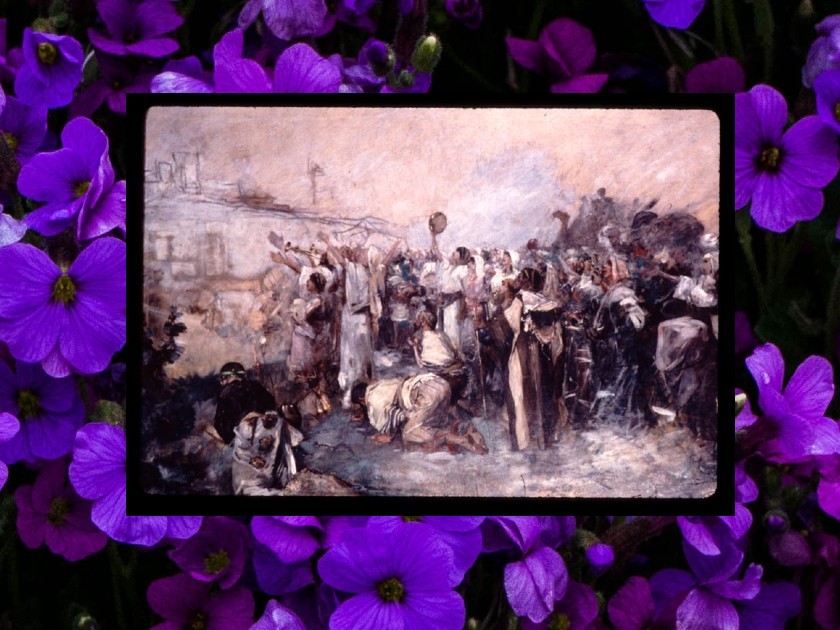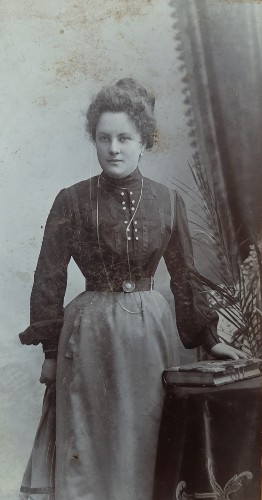
Miriam’s Song, painting, Center for Jewish History, Yeshiva University Museum
1. Growing up in the religious world, I was raised on the stories of the Bible as if they were part and parcel of my soul — my emotional DNA. As a child, I was exposed to the world of the Brothers Grimm, with its princesses, fairies, and the black forest, together with that of Moses, God, and the Israelites in the great desert. But the ones who truly captivated my imagination were the women of the Bible, whom I felt I didn’t know as intimately as I wanted to. We live in exciting times, a true turning point in history; after a two-thousand-year wait, finally we women are writing and interpreting the stories of these female characters.
In third grade, my teacher at the religious school I attended taught us the following exegesis: “Do you know why so many of our biblical mothers were barren?” An entire classroom of Jewish girls blinked in ignorance. Not one of us knew the answer: “It’s because God wanted to receive all the righteous women’s prayers.” She was smiling when she said this. Believing she was telling us something beautiful.
2. Today I know that the author of that exegesis was a man. No woman could have penned it. By which I mean, no woman would want to write something like that. And that’s the true achievement of modern female biblical interpretation — viewing the story from a female perspective; to see the female characters as round and multidimensional, to turn the spotlight on them, and above all, display curiosity and love towards them.
When I wrote The Others, a psychological thriller that grapples with the subject of childfree women, I was aware that this wasn’t new, that childfree women existed even in biblical times. Reading about these women, I also realized how the whole concept of family in the Bible — the relationships between husband and wife, parents and children — is both very different from the way we experience it today, and in some ways indistinguishable from two thousand years ago.
3. I’m named after my grandfather’s mother. After the Holocaust, only a single photo of her survived — a beautiful woman with a solemn expression and earnest, bright eyes. Thanks to my name, I have always felt a special kinship with the biblical Sarah. Sometimes it seems that I’m the only one who likes her, that she’s the least popular among the four matriarchs, and no one is willing to look past her bullying of Hagar and her forcing Abraham to drive her out into the wilderness.
But she had her reasons. Imagine Sarah stuck in the desert, getting older, yearning for a child. She pinned all her hopes and dreams on a child born to Hagar and Abraham, but those dreams didn’t quite pan out. According to biblical commentators, a new family unit comprised of Hagar, Abraham, and Ishmael was formed, leaving Sarah out in the cold, still yearning.

Author’s grandfather’s mother, image courtesy of the author
Unable to watch her suffer any longer, God told Abraham that he and Sarah would have a son. Instead of thanking God, he immediately asked him to favor Ishmael by making him the heir). Abraham didn’t stop to consider Sarah’s lifelong dreams of a family.
Then comes Sarah’s laughter in the tent. Some commentators argue that it was at that precise moment, she laughed, that her womb “opened” and she became fertile. One year later, Isaac is born. At last, Sarah’s maternal instinct is brought to bear. Sarah is a real mama bear; the moment she has the slightest inkling that Ishmael poses a threat to Isaac, she casts him and his mother out into the desert without batting an eyelid.
According to biblical commentary, once Sarah catches wind of the whole binding business and learns that her son is being prepared for sacrifice, her heart stops beating — she dies on the spot. Up until this moment, Isaac is a classic “mama’s boy,” loving Sarah with all his heart and completely dependent on her; he doesn’t marry until she passes away. I love the verse that describes the moment Isaac brings Rebecca into his mother’s tent — and only then falls in love with her. He has finally found someone to take his mother’s place.
4. Rebecca: a dominant wife and a dominant mother. The Bible doesn’t sugarcoat her story; Rebecca clearly played favorites with her children, as did her husband. Today this would have been unacceptable, but these were biblical times, and they were all about physical survival, not emotional.
Rebecca loved Jacob with every fiber of her being, but despite that love she didn’t hesitate to hurt Esau, their other son. I can understand why she favored Jacob, the two shared certain qualities: both were bright and manipulative. (History has been repeating itself since the beginning of time.) Rebecca might not have been a model mother to Esau, but her love for Jacob is palpable and bleeds off the page.
5. We’ve finally made it to Rachel and Leah. Leah is the fertile wife, and Rachel the barren one. According to one interpretation, it was because Leah felt guilty for her role in tricking Jacob into marriage that she didn’t get pregnant right away. Only after Jacob and Rachel married, and she saw the love and intimacy between them, did envy replace her guilt. And so she was finally able to get pregnant.
Leah’s sons were an embodiment of her hope that Jacob would grow to love her; the names she gives her sons manifest not a mother’s love for her children, but rather her desire for her husband’s love.
Rachel, on the other hand, is pining for children, not as a means to win over Jacob’s heart (since it already belongs to her) but for the sake of becoming a mother. During an argument with Jacob, she cries out to him: “Give me sons, or I shall die.”
While she indeed gets the two sons she wished for, she dies giving birth to the second one — Binyamin. And again history repeats itself, with Jacob favoring Joseph over his brothers, in part because of his physical resemblance to Rachel.
In the Bible, just like today, a parent’s love for their child is a fierce emotion, but sometimes, it belies other, equally fierce emotions.
6. I myself don’t have children.
I always assumed I would, but then the years went by, and “life” happened— relationships, art, writing — and here I am, forty-seven years old, living a life sans children. A life that suits me.
In my writing I always try to gaze into the past, to reflect on ancient Jewish myths and famous biblical figures, and see to what degree they resonate today. I’ve come to believe that the key difference between then and now is a woman’s ability to choose. Even now, reading about the biblical mothers again, I think to myself: it’s true that there are many parallels that apply to the present, mostly psychological, but how fortunate are we to live in a time when we have the ability to choose?
So I thank the biblical mothers, I reflect on their lives and write about them with admiration, all the while walking my own path.
Sarah Blau is an author and playwright, recipient of the 2015 Prime Minister’s Prize for Hebrew Literature, and the 2017 Bar-Ilan University Alumni Achievement Award in recognition of her contribution to enriching culture in Israel and her activity in the fields of literature and communication. Considered a prominent voice in religious Israeli literature, she identifies herself as “religious-lite.”